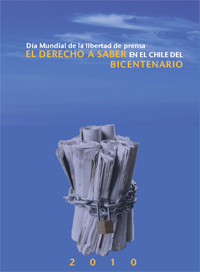Día Mundial de la libertad de prensa 2010. El derecho a saber en el Chile del Bicentenario

The fundamental principles of freedom of the press are celebrated worldwide on 3 May. This date gives pause to assess advances made – and ground lost – in the defence of the communications media and in attacks against its independence, and of course is a time to pay tribute to the journalists who have given their lives in the cause of honest reporting.
Deaths, threats, disappearances and direct aggression against journalists, as well as their imprisonment, demand the most fervent efforts of both national and international organizations for the defence of human rights and the freedom of the press. With that in mind, Chile commemorated World Press Freedom Day in 2010 under the headline “The Right to Know” , giving special acknowledgement to the relevance of new technologies.
It was under this banner that the Regional Bureau of Education for Latin America and the Caribbean (OREALC/UNESCO Santiago), the Freedom of Expression Programme at the Institute of Communications and the Image of the Universidad de Chile, the UNESCO Chair in mass media and citizen participation at the School of Journalism of the Universidad Diego Portales, the national journalists’ professional body (Colegio de Periodistas), and the Library of Santiago organised jointly a seminar on “Favouring the Right to Know in Chile on its Bicentennial” , held on 4 May, 2010, at the Library of Santiago.
Concern for the media and social networks in disaster situations was a major issue in one of the event’s discussion sessions. The other inescapable topic was that of contributing to the evaluation of the country’s freedom of information law one year after its implementation. What are its main strengths and weaknesses? How can journalism contribute to the dissemination of this right, while also using it as a tool in day to day reporting? What gaps must still be addressed? And finally, how can the citizenry be empowered to gain awareness and to take ownership of the right to know?
This document gives an account of discussions held under the auspices of the seminar – discussions that should be ongoing and not limited to an annual commemoration, nor a duty only for journalists and communications professionals, but rather for all citizens who have the responsability to stay informed on their rights to communication, exercise these rights, demand them, and insist that they are respected by all parties involved.
- Publication Date: 16-05-2011

